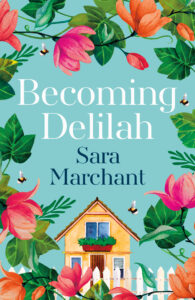Sara Marchant: Interview – copy
- 15th June 2023
- Category : Blog
Sara Marchant is a founding editor of the feminist literary collective and magazine Writers Resist. She is the author of a memoir, Proof of Loss (2019), and a novella ,The Driveway Has Two Sides (2018), on which Becoming Delilah is based.
Has being a founding member of Writer’s Resist influenced your writing?
It has, but not the way one would maybe think. Reading and editing the writing of others works different muscles and helps me see where my work needs strengthening. Plus, reading through the eyes of someone else develops compassion—and compassion is essential for a writer.
Where any of the characters inspired by people in your life?
This is where I should go on record again and state that my mother is NOT the basis for Abuela. She’s not. I swear. But the bus ride is an homage to my mom’s escape from Colorado to California in the late 1950s. There is one scene that is inspired by an experience of my sister and the rusty truck scene when Dolores runs to the safety of other little girls is based on something that happened to me when I was 10.
Do you love gardening as much as Delilah?
Nobody loves gardening as much as Delilah! But gardening is an activity my husband and I enjoy together. We spend hours in ours during the spring and summer.
If you could say one thing to Delilah and Anton, what would it be?
It’s all said in the book really. And perhaps I shouldn’t say this but: I’m team Ted.

You’ve mentioned in your interview for The Driveway has Two Sides that the undercurrent of domestic violence and patriarchy is subtle because that’s often the nature of those realities. You also mentioned not wanting to overload on Delilah’s past. What was the reason behind creating Becoming Delilah where her past is now substantially integral to the story?
Fleshing out Delilah’s origin story was really the joy of the novella to novel experience and essential to why Delilah is the person she ultimately creates. The nature of the timeline- we live the violence as she does- now is such that it can’t be subtle. Little Dolores is bereft when we meet her, grown Delilah is shaped by the violence she witnessed but doesn’t focus on it, and certainly doesn’t speak about it, because she’s living under an alias. And the alias gives her power, however slight, to be perceived as she wishes to be. She’s created a persona who does things; she doesn’t think about the past because she’s too busy creating a safe, secure life—or, you know, that’s what she thinks.
How did you approach the theme of perception and identity in Becoming Delilah?
Becoming Delilah was written in the darkest days of the pandemic. We didn’t have a vaccine yet, there were morgue trucks in the major cities; my family lost two aunts, an uncle, two best friends and I lost my teaching job. All I had was time to think. Especially about who we are as people when we know we are under scrutiny and who we are when the social safety net fails us. Abuela and Dolores are failed by the ones who were meant to keep them safe; what I wanted to write about was how that shaped the rest of their lives.
Lastly, was there anything particularly difficult in writing Delilah’s and Dolores’s story?
Transitions are always hard for me. I knew the ending (of course, I had a guideline ha!) and I knew it needed to open with the death of Dolores’s mother, but Dolores’ transition into Delilah was a puzzle I circled for ages until the library materialized (and it was the smell of old books and refrigerated air that came to me first) and then the character of Aunt Gisella. Once I had those elements, I knew what needed to happen but I still worry about that chapter. I think about it when I’m washing dishes *sigh*.
Becoming Delilah is out now. Order now from Blackwell’s and Waterstones.
To find out more about Sara visit her author page.














